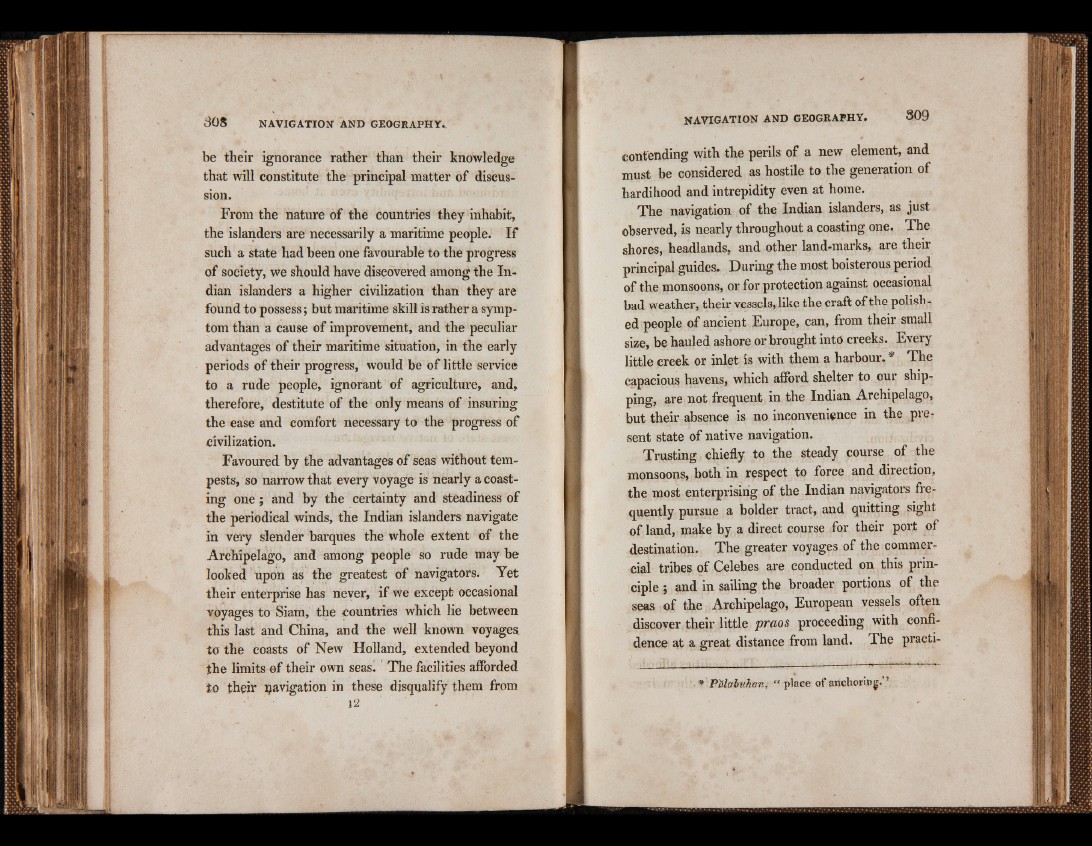
be their ignorance rather than their knowledge
that will constitute the principal matter of discussion.
From the nature of the countries they inhabit,
the islanders are necessarily a maritime people. If
such a state had been one favourable to the progress
of society, we should have discovered among the Indian
islanders a higher civilization than they are
found to possess; but maritime skill is rather a symptom
than a cause of improvement, and the peculiar
advantages of their maritime situation, in the early
periods of their progress, would be of little service
to a rude people, ignorant of agriculture, and,
therefore, destitute of the only means of insuring
the ease and comfort necessary to the progress of
civilization.
Favoured by the advantages of seas without tempests,
so narrow that every voyage is nearly a coasting
one; and by the certainty and steadiness of
the periodical winds, the Indian islanders navigate
in very slender barques the whole extent of the
Archipelago, and among people so rude maybe
looked upon as the greatest of navigators. Yet
their enterprise has never, if we except- occasional
voyages to Siam, the countries which lie between
this last and China, and the well known voyages
to the coasts of New Holland, extended beyond
the limits of their own seas. The facilities afforded
to their navigation in these disqualify them from
■■ 5 12 ’
contending with the perils of a new element, and
must be considered as hostile to the generation of
hardihood and intrepidity even at home.
The navigation of the Indian islanders, as just
observed, is nearly throughout a coasting one. The
shores, headlands, and other land-marks, are their
principal guides. During the most boisterous period
of the monsoons, or for protection against occasional
bad weather, their vessels, like the craft of the polished
people of ancient Europe, can, from their small
size, be hauled ashore or brought into creeks. Every
little creek or inlet is with them a harbour, * The
capacious havens, which afford shelter to our shipping,
are not frequent in the Indian Archipelago,
but their absence is no inconvenience in the present
state of native navigation.
Trusting chiefly to the steady course of the
monsoons, both in respect to force and direction,
the most enterprising of the Indian navigators frequently
pursue a bolder tract, and quitting sight
of land, make by a direct course for their port of
destination. The greater voyages of the commercial
tribes of Celebes are conducted on this principle
; and in sailing the broader portions of the
seas of the Archipelago, European vessels often
discover their little praos proceeding with confidence
at a great distance from land. The practi*
Palabuhan, “ place of anchoring«’’